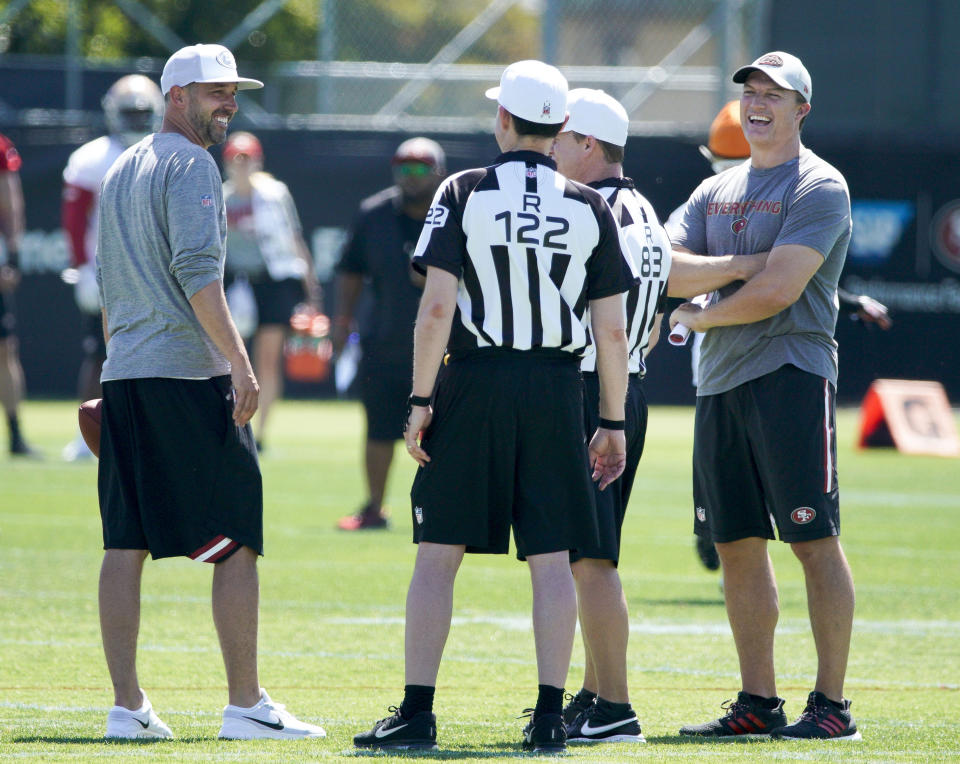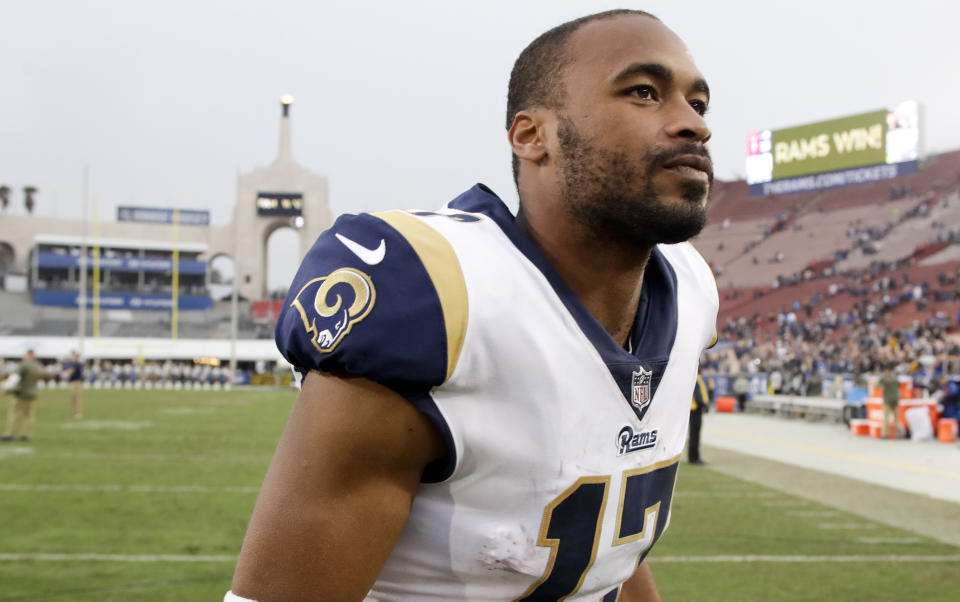The things NFL teams would like coaches and players to keep secret on their summer break
SANTA CLARA, Calif. – In 2017, when San Francisco 49ers head coach Kyle Shanahan was asked about his plans for the offseason break, he committed two of the cardinal sins against NFL security.
First, he answered the question.
Second, he answered the question in truthful detail.
“When I first got here two years ago, [reporters] asked me about my break and I went through all of it,” Shanahan said with a smile. “I was like, ‘Oh, I’m going to go to Cabo for a couple weeks. Then I’m going to go here and then go here.”
Two years later, Shanahan has learned rule No. 1 preached by NFL team security when players, coaches and personnel head to the offseason break: Don’t tell people what you’re doing in detail. Most especially if it involves leaving town.

It’s a lesson that has been displayed to the NFL multiple times in the past two years, with the high-profile home burglaries of Los Angeles Rams head coach Sean McVay and former New England Patriots tight end Rob Gronkowski. Not to mention some thefts that didn’t grab major headlines, like Rams wideout Robert Woods. It was Woods who moved out of a West Hollywood home following a 2017 burglary only to be burglarized a second time at his new Woodland Hills home, the latter time by an alleged ring of thieves targeting high-profile marks.
With social media offering vast swaths of data about players – from their homes to their possessions to their whereabouts in real time – teams have been pounding home the focus on information security. It’s a year-round effort that may never be more important than the next month, when the NFL goes to sleep and the majority of the league sets off for far-flung vacation spots that often creates a lucrative target on homes, cars or at times, even the players themselves.
This explains Shanahan’s tongue-in-cheek response this week when reporters asked about his plans for the upcoming break.
“I messed this up two years ago … so I sit in my house and protect it. I’m always there.”
It was a funny moment that drew a chorus of laughter. But there was an underlying point that speaks to how NFL teams are handling a social media world that has basically geotagged professional sports teams. Not only do we know when athletes or coaches get time off, we often know precisely how they’re spending that time. Combine that with particles of information about their homes, possessions and even the money or jewelry they might be carrying with them at any given time, and it’s revealed how this creates a problem for team security.
As one NFL team official told Yahoo Sports this week, “It’s crazy what is out there now on our guys, whether it’s from their social media accounts or a family member or a significant other. So we have to make that a priority with them when we get [this] time off. It’s just like, ‘Be mindful of what you’re sharing with people you don’t know because they can use all of that against you as soon as you’re vulnerable.’ ”
As part of that effort, every NFL team has some kind of security seminar for players each year – often with an additional reminder before the summer break. And one of the underlying points is that some people with bad intentions have put time into learning the rhythms of professional teams and athletes. They are now treated as very reachable opportunities when it comes to burglary, armed robbery and other crimes.

McVay, Gronkowski, Woods and some other athletes (like former Los Angeles Dodger Yasiel Puig) learned the hard way, becoming burglary victims over the past 18 months. All of them were disturbing, but McVay’s Encino theft was particularly concerning. According to a Rams source, police believe those who broke into McVay’s home surveilled it and learned the comings and goings of both the coach and his girlfriend. Once they knew the patterns, the burglars entered the home and stole over $20,000 of jewelry and other items.
Since that burglary in April, it has been a stark example used by teams in their NFL security meetings. And the message is this: If you’re posting on social media accounts and people are seeing the things you own and could possibly know where you live, that’s a serious problem. The less said about plans, and the less posts showing off possessions, the more difficult it is for someone to take advantage.
“A lot of these guys we have now, they have grown up with a life mindset of sharing everything,” one team official said. “And they have to learn that isn’t in their best interests anymore. It’s not just the players, either, who can be an issue. A lot of the time it’s their friend’s social media page that becomes the problem. Or a family member. Or the significant other. Now you have to explain to them that all of that is being watched.”
Over time, teams have all run into their fair share of social media or “oversharing” situations that had to be turned into examples of what to avoid.
Among some of the more prominent ones:
What happens in Vegas can get someone robbed in Vegas
Over the years, Floyd Mayweather Jr. has repeatedly lit a fire on social media while flaunting bricks of cash and massive gambling wins. In the wake of that, NFL teams noticed that players were occasionally popping up on their Vegas trips and seemingly mimicking some of Mayweather’s antics. And they were doing it in real time, when other people in Las Vegas were still likely to see them out in public. All of which made one Mayweather social media stunt a thorn for teams: Fanning out mountains of cash on a hotel bed.
According to one team, one of its All-Pro players spread out tens of thousands of dollars on his hotel bed and then posted a picture of it on social media during his rookie season. Another team had a Pro Bowl player win nearly $40,000 one night and photographed himself laying on the bed with his cash. In the latter instance, a team official called and told the player, “If I was in Vegas right now, I’d konk you on the head and take that money.”
And in one other instance that will be hard to top, a player briefly posted a 3 a.m. video of himself standing on his bed, pouring hundreds of $1,000 yellow Bellagio poker chips onto his feet from a Louis Vuitton backpack. The video was quickly removed, but a team official found out anyway, prompting a lengthy phone call.
An invitation for one is not an invitation for everyone
NFL players either receive or produce their fair share of party invites, particularly over the break, when they have time and money to burn. And whether it’s a rookie draft party, a private charity event or even a Super Bowl ring ceremony, someone occasionally takes a picture of the invite and blasts it out to their followers, creating the kind of mayhem you’d expect.
One prominent rookie in recent years decided to host his own draft party for family and friends. Everything was going along as planned, until someone posted their invite on social media. The result: A few fans in the area tried to crash the event, going as far as dressing for the part and bringing their own counterfeit invitations.
A bigger mistake? Posting the invitation to the team owner’s Super Bowl ring party, including the boss’s home address and information to RSVP for the event. One player did it, with the social media post lasting long enough for a handful of fans to attempt to RSVP for the ceremony. The team was understandably miffed.
Don’t give away AMEX Black Card info on social media
The black American Express Centurion Card is one of most undeniable status symbols of being a professional athlete. From the insane packaging that accompanies the arrival of the card to the sheet metal material weight and sleek look. Understandably, players are excited to get them. Team security is less enthused when that big day becomes a social media moment.
Occasionally, the arrival of a black Amex can lead to dumb things. In the past, there have been social media posts where players have shown portions of the card or the swanky box it arrives in. That alone is white-knuckling. But one team had a rookie who took a picture of his entire card – with all the important charging digits on display – and posted it online. His team intervened and the picture came down quickly, but that instance continues to be retold with some face-palming from team officials.
A picture of a house is a treasure map
Players are warned against posting pictures that showcase their homes, even if it’s something inadvertently appearing in the background. If someone can see it, they can often figure out the location and what can be stolen. And if it’s the offseason break and a player is likely to be on vacation, all of those old pictures from inside the home become a nice little master file for someone who is preparing to break into a residence. All a thief needs is to know how one prime room is laid out and what windows or doors provide an entry or exit.
Bedroom photos are major no-no’s, too. Largely because many people keep their most valuable items – like home safes and jewelry – in the master bedroom closets.
Live inside your vacation. Not inside your Instagram.
That quote is an annual social media mantra from one team to its players. Most especially when the summer break comes and players head off to far-flung destinations. The advice given by the team: You don’t have to post everything (or even anything) from the private jaunts. But if you must, wait until you come home to re-live the experience rather than putting up photos in real time and announcing that your home may be empty. This advice is a consistent source of prodding from almost every NFL team when it comes to vacationing players.
As one team official put it, “We like to tell our guys, ‘Live your life. Don’t post your life.’” That mantra encapsulates what teams would like to have players remember over the next month. Enjoy vacation or kick back at home. Swipe that black Amex until a wrist cramps. Throw a party. Attend a party.
Just don’t announce it to the millions of strangers who are one video clip or social media post away.
More from Yahoo Sports:

